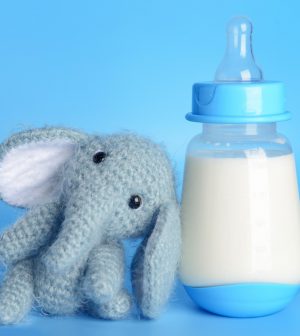- Could Artificial Sweeteners Be Aging the Brain Faster?
- Techniques for Soothing Your Nervous System
- Does the Water in Your House Smell Funny? Here’s Why
- Can a Daily Dose of Apple Cider Vinegar Actually Aid Weight Loss?
- 6 Health Beverages That Can Actually Spike Your Blood Sugar
- Treatment Options for Social Anxiety Disorder
- Understanding the Connection Between Anxiety and Depression
- How Daily Prunes Can Influence Cholesterol and Inflammation
- When to Take B12 for Better Absorption and Energy
- Epsom Salts: Health Benefits and Uses
Expert Tips to Help Parents Cope With Baby Formula Shortage

As U.S. parents struggle to find formula to feed their infants during a nationwide shortage, they may not know what to do.
Experts from Penn State Health Children’s Hospital offer some safe suggestions for navigating the issue.
To start with, consider trying a different brand of formula if you can’t find the one you would typically buy. It may make babies a little fussy or gassy for a few days while they adjust, but many times their behavior won’t change.
“Cow’s milk-based formulas of different brands are very similar and they all undergo rigorous testing standards that are required by the U.S. Food and Drug Administration,” Penn State Health pediatrician Dr. Katie Shedlock said in a hospital news release.
If your older infant is using a specialty formula for cow’s milk protein intolerance, talk with your pediatrician about trying a non-specialty formula. You may find they’ve “outgrown their sensitivity and can instead use regular formula,” said Dr. Nicole Hackman, pediatrician and medical director for lactation services at the hospital.
Call stores in advance to see if they have formula in stock and will hold a can for you, rather than driving around. Check smaller, local stores and pharmacies or shop online on the formula manufacturer’s website, or through a trusted U.S. retail site. Don’t stockpile formula, buying about 10 days’ to two weeks’ worth when you find it, not more.
“We want to make sure formula is available to all babies who need it,” Shedlock said.
If you can’t find formula after checking around, check in with your pediatrician. If you’re under-resourced, reach out to community services, the experts suggest.
“We’re getting calls from individuals who are under-resourced and don’t have the ability to go to a bunch of different places to get formula,” said Kim Grey, a pediatric care management social worker with Penn State Health Pediatrics.
Grey advises that families who use WIC — the federal Special Supplemental Nutrition Program for Women, Infants and Children — to call their local WIC office. While WIC typically would only cover a specific formula, the program will now cover certain equivalent alternatives due to the shortage.
Parents can also call 211 — a United Way resource that can put them in touch with food banks — or contact their local Community Action Partnership office.
Some women may be able to return to breastfeeding, which may be possible for some with time, effort and a lactation specialist.
“If a mom is able and interested, she can try ‘relactation,’ a process to help restart breastmilk production,” Hackman said in the release. She’s had patients over the years — including adoptive moms of infants — successfully work with lactation specialists to induce or reestablish lactation.
The experts also offered several suggestions on what not to do.
Do not make your own formula.
“We’ve had patients who’ve seen homemade formula recipes on social media call us to ask if that’s OK,” Shedlock said. “It most definitely is not. The risks are just too high for electrolyte imbalances — which can cause seizures and even death — as well as nutritional deficiencies.”
Don’t dilute the formula, which puts infants at great risk for abnormal electrolytes, Hackman said.
“We’ve seen this in infants in the past where it’s happened by accident — not measuring the formula powder correctly — resulting in a baby having seizures,” Hackman said. She recommends following the manufacturer’s steps to mix formula.
Cow’s milk is also not a good substitute. Babies can’t handle the protein component in cow’s milk, and it can cause intestinal bleeding.
“We never recommend cow’s milk until babies are 1 year old for these reasons,” Shedlock said.
If your infant is at least 6 months old and you absolutely have no other recommended alternatives, the American Academy of Pediatrics states you can use cow’s milk for up to one week at the most.
Also, do not use goat’s milk or plant-based milks, which are often low in protein and minerals.
Don’t substitute with formula meant for a different age. Save formula intended for premature babies for the babies who must have this type of formula. Toddler’s formula is also not a good choice for infants.
“Infant formula is very well-regulated for both nutrition and safety,” Shedlock said. “Toddler formula is not. It should only be considered as a last-resort option for older infants and then only for a few days at most.”
More information
Yale Medicine also offers some tips for parents on coping with the formula shortage.
SOURCE: Penn State Health Children’s Hospital, news release, May 25, 2022
Source: HealthDay
Copyright © 2026 HealthDay. All rights reserved.










